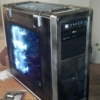-
Posts
33 -
Joined
-
Last visited
Awards
This user doesn't have any awards
Profile Information
-
Gender
Male
-
Location
The States
-
Occupation
Software Engineer (The real deal, compiled stuff)
System
-
CPU
i5 Haswell 3.7ghz
-
RAM
16gb ddr3
-
GPU
gtx 780
-
Case
Cosair ammo box
-
Storage
3x128GB SSD in RAID-0 + 1.5TB HDD
-
PSU
700W
-
Display(s)
Samsung 305T 30" 2560x1600
-
Cooling
stock cooler :)
-
Sound
Yamaha Amp with Individual Definitive speakers in surround
-
Operating System
Window 8.1
CatLovingCoder's Achievements
-
I am planning on switching to Linux; however, I will be retaining a copy of windows for gaming. The windows OS will get its own hard drive. I am trying to decide whether to duel boot or run Windows in a VM. The VM sounds good, but I fear it will be more error prone. Is this a valid concern? This PC will have very high end hardware if that's a concern. Something like the new intel six core extreme and 2x 980ti in sli. Bonus Points: Good VM app for linux?
-

Do you need to be good at Maths to be a great coder?
CatLovingCoder replied to AstroBenny's topic in Programming
Yes, you do need to be good at math to be a great coder. However, you do not need to be good at math to be a employed coder, or even above average (the bar is not high). However, you will never be a great coder if you are not good at math because you will not understand the underlying fundamentals of computing. Also, forget about programming games if you are not good at math. -
Same thing happens to me, but only when I don't use the computer for a while... Never while I am actively using it
-
Don't hate on me, but I've never been a huge Linux fan... For me, Windows has always been the perfect combination of usability and customizability. And let's be honest here, there's no such thing as the Linux OS... it's just the kernel.... and mac, well we all know they just suck. However, I am not too keen on having a key logger built into my computer, so for my next system I will be at the very least double booting, Windows for games, and Linux for everything else. I am a .Net dev so hopefully Mono will be good, but I might have to use windows for that too if I need new features I guess. I will also be building my own Linux router and block M$ traffic (already doing it on my current router) but addresses can change so the main rig should prbly also be Linux. Anyway back to the main topic, there are so many distros! Although, I am concerned about privacy, I don't even pirate so I don't think I need tails. Basically, the two main things I am looking for are similarities to Windows UI wise (X button on the right please) and application availability. I plan on running it on a pretty beast rig if that matters. I'd appreciate your suggestions. Thanks! EDIT: I've used Red Hat for work so I'm not a complete newb
-
Wrong again You are not really dumb, or even dumb. You are just learning something that is not widely known or taught and that you had no real way of knowing. Now, if you continued arguing with me, that would make you dumb
-
no. Windows might be smart enough to install generic drivers, but not processors. Over-simplification ahead: CPUs are just big dumb calculators. They do what the are told similar to how you press 1, +, 2, = on your calculator. Programs tell them what to do with a language called x86/x64. Because CPUs understand x86, they do not NEED drivers; although, they do HAVE drivers. Drivers are what an OS uses to know how to communicate with a certain piece of hardware. How would the OS even run the driver in the first place if the CPU needed a driver? Your Windows DVD would need its own processor just to load and run the driver. The reason auxiliary hardware needs drivers is because it does not speak x86 machine code. The drivers for CPUs merely support none standard features, add support for onboard graphics, allow the OS to dance around some hardware specific problems, and sometimes know a little bit more about the CPU and perhaps leverage it more efficiently. If CPUs used drivers the way you are thinking you could install Android (which is compiled for ARM) directly on you i7 machine with just a driver update. BIOS loads the OS -> OS Loads the drivers -> drivers allow OS to talk to the auxiliary hardware
-
I am sorry, but I have to jump in here. CPUs don't need drivers because they operate on a specification called x86/x64. If they needed a driver, your computer would not be able to boot into Windows. Now, in some cases, it might be that the CPU needs a driver to leverage additional features, for example the on board video card; but, in general CPUs operate on machine code.



